- Home
- Jacqueline Wilson
Jacky Daydream Page 2
Jacky Daydream Read online
Page 2
‘She positively gushed over you. She said she’d never seen such a clean baby, so perfectly kept, everything just so. She said I was obviously a dab hand at washing and ironing.’
It’s interesting that the one children’s classic picture book my mother bought for me was Beatrix Potter’s Mrs Tiggywinkle. My mother didn’t like animals: ‘Too dirty, too noisy, too smelly.’ She usually turned her nose up at children’s books about animals, but though Mrs Tiggywinkle was undoubtedly a hedgehog, she was also a washerwoman, and a very good one too.
* * *
Which baby in one of my books is discovered without any clothes at all on the day she is born?
* * *
It’s April, in Dustbin Baby. She’s abandoned by her mother, thrust into a dustbin the moment she’s born.
I cry and cry and cry until I’m as red as a raspberry, the veins standing out on my forehead, my wisps of hair damp with effort. I am damp all over because I have no nappy. I have no clothes at all and if I stop crying I will become dangerously cold.
I’ve always wondered what it must be like not to know your own family. Imagine being told to crayon your family tree at school and not having a single name to prop on a branch. April doesn’t know who her mother is, who her father is. She doesn’t know who she is. So she sets out on her fourteenth birthday to find out.
4
Housewife’s Choice
BIDDY DIDN’T JUST keep me sparkling clean. She fussed around our rented flat every day after breakfast, dusting and polishing and carpet-sweeping. She didn’t wear a turban and pinny like most women doing dusty work. She thought they looked common.
She listened to the Light Programme on the big wooden radio, tuning in to Housewife’s Choice, singing along to its signature tune, doobi-do do doobi-do, though she couldn’t sing any song in tune, not even ‘Happy Birthday’.
When she was done dusting, we went off to the shops together. You couldn’t do a weekly shop in those days. We didn’t have a fridge and there was so little food in the shops, you couldn’t stock up. You had to queue everywhere, and smile and simper at the butcher, hoping he might sell you an extra kidney or a rabbit for a stew. Biddy was pert and pretty so she often got a few treats. One day, when he had no lamb chops, no neck or shoulder, he offered my mum a sheep’s head.
She went home with it wrapped in newspaper, precariously balanced on the pale green covers of my pram. She cleaned the head as best she could, holding it at arm’s length, then shoved it in the biggest saucepan she could find. She boiled it and boiled it and boiled it, then fished it out, hacked at it and served it up to Harry with a flourish when he came back from work.
He looked at the chunks of strange stuff on his plate and asked what it was. She was silly enough to tell him. He wouldn’t eat a mouthful. I was very glad I still had milk for my meals.
She couldn’t go back to the butcher’s for a few days as she’d had more than her fair share of meat, so she tried cutting the head up small and swooshing it around with potatoes and carrots, turning it into sheep soup.
Harry wasn’t fooled. There was a big row. He shouted that he wasn’t ever going to eat that sort of muck. She screamed that she was doing her best – what did he expect her to do, conjure up a joint of beef out of thin air? He sulked. She wept. I curled up in my cot and sucked my thumb.
There were a lot of days like that. But in the first photos in the big black album we are smiling smiling smiling, playing Happy Families. There are snapshots of days out on the tandem, blurred pictures of me squinting in the sunlight but still smiling. I’m in my summer woollies now, still wearing several layers, but at least my legs are bare so I can kick on my rug.
There are professional photos of me lying on my tummy, stripped down to my knitted knickers, smiling obediently while Biddy and the photographer clapped and cavorted. There are pictures of me sitting up on the grass but I always have a little rug under me to keep me clean. There’s even a photo of me in my tiny tin bath. What a palaver it must have been to fill it up every day and then lug it to the lavatory to empty it.
My grandma must have been stitching away as I’m always wearing natty new outfits. By the autumn I’m wearing a tailored coat with a silky lining, a neat little hood and matching buttoned leggings, with small strappy shoes even though I can’t walk properly yet.
I had my first birthday. Biddy and Harry gave me a book – not a baby’s board book, a proper child’s history book, though it had lots of pictures. Biddy wrote in her elaborately neat handwriting: To our darling little Jacqueline on her first birthday, Love from Mummy and Daddy.
I don’t think I ever read my first book, but when I was older, I liked to look at the pictures, especially the ones of Joan of Arc and the little Princes in the Tower. I think my grandma might have made me felt toy animals because there’s a photo of me sitting on the rug between Biddy and Harry, playing with a horse with a felt mane and a bug-eyed fawn.
The local paper did a feature on young married couples living in Bath and Biddy and Harry were picked for it. She’s wearing a pretty wool dress embroidered with daisies and thick lisle stockings. Harry is wearing a smart suit with a waistcoat, probably his year-old wedding suit, but he’s got incongruous old-man plaid slippers on his feet. Did he have to change his shoes the minute he got inside the front door in case he brought mud in?
We look a happy little threesome, sitting relaxed in front of the fire. We needed that fire during the winter of 1946/1947. It was so cold that all the pipes froze everywhere. The outside lavatory froze up completely. There was no water, not even cold. Harry had to go up the road with a bucket and wait shivering at the standpipe. Biddy stuck it out for a few weeks, but then she packed a big suitcase for her, a little one for me, dismantled my cot, balanced the lot on my pram, and took us to stay with my grandparents in Kingston.
We stayed on, even when it was spring. Harry lived by himself in Bath until the summer, and then left the Admiralty and managed to get a job in the Civil Service in London, even though he’d left school at fourteen. They looked for a place to rent but half of London had been bombed. There were no flats anywhere, so Harry moved in with my grandparents too.
* * *
Which of my books starts with the main girl describing all the beds she’s ever slept in, including her baby cot? For a little while they live with her step-gran, though it’s a terrible squash – and my poor girl has to share a bed with this grandma.
* * *
It’s The Bed and Breakfast Star.
I had to share it with her. There wasn’t room in her bedroom for my campbed, you see, and she said she wasn’t having it cluttering up her lounge. She liked it when I stopped cluttering up the place too. She was always wanting to whisk me away to bed early. I was generally still awake when she came in. I used to peep when she took her corset off.
She wasn’t so little when those corsets were off. She took up a lot of the bed once she was in it. Sometimes I’d end up clutching the edge, hanging on for dear life. And another thing. She snored.
I love Elsa in The Bed and Breakfast Star. She’s so kind and cheery, though she does tell really awful old jokes that make you groan! I’m not very good at making up jokes myself, so when I was writing the book, I asked all the children I met in schools and libraries if they knew any good jokes, and then I wrote them down in a little notebook, storing them up for Elsa to use. There were a lot of very funny jokes that were unfortunately far too rude to print in a book!
There used to be several bed and breakfast hotels for the homeless in the road where I lived. I used to chat to some of the children in the sweetshop or the video shop. I knew how awful it must be to live in cramped conditions in a hotel, and many of their mums were very depressed. Still, the children themselves seemed lively and full of fun. I decided to write a book about what it’s like to be homeless, but from a child’s point of view.
The Bed and Breakfast Star has a happy ending, with Elsa and her family living in the very posh luxury
Star Hotel – though I don’t know how long they’ll be able to stay there!
5
38 Fassett Road
WE LIVED AT 38 Fassett Road, Kingston, for the next two years. I was probably the only one of us who liked this arrangement. It was much more peaceful living with Ga and Gongon. These were the silly names I called my grandparents before I could talk clearly and I’m afraid they stuck.
It must have been difficult for my grandparents having a volatile couple and a toddler sharing their living room, cluttering up their kitchen, using the only bathroom and lavatory. It must have been agony for my parents not being able to row and make up in private. They couldn’t even be alone together in their own bedroom because I was crammed in there with them in my dropside cot.
I didn’t have my own bedroom until I was six years old. I didn’t really need one when I was little. I didn’t have many possessions. I had my cot. I had one drawerful of underwear and jumpers in my mother’s chest of drawers. I had one end of her wardrobe for my frocks and pleated skirts and winter coats.
I had my toys too, of course, but there weren’t many of them. It was just after the war and no one had any money. I did royally compared with most little girls. My first doll was bigger than me, hand-made by my Uncle Roy. He was in hospital a long time during the war because his whole jaw was shot away and had to be reconstructed. He passed the time doing occupational therapy, making a huge doll for me, and then later one for his newly born daughter Rosemary.
I called my doll Mary Jane. She had an alarmingly nid-noddy head and her arms and legs dangled depressingly but I tried hard to love her. She had brown wool curls, a red felt jacket and a green skirt. You could take her clothes off but then she looked like a giant string of sausages so I generally kept them on. Mary Jane never developed much personality, but I remember being astonished on a rare visit to my uncle and aunt’s to find that Rosemary’s twin doll had exactly the same staring face and woolly hair and dangling body but wore a yellow jacket and a blue skirt. It was as if I’d found a letter box painted yellow, a lamppost painted blue. She was my first doll, my only doll, and I thought all other rag dolls would be identical.
I was given a new doll the next Christmas. I had a doll every single Christmas throughout my childhood – and a book for my birthday. My next doll was Barbara. She was a real shop-bought doll with a cold hard body and eyes that opened and shut if you tipped her upside down. The first day I owned her I tipped her backwards and forwards until she must have been dizzy, and her eyelids went click click click like a little clock. Her eyes were brown and her hair was short and brown and curly, rather like mine. She had a frock with matching knickers and little silky white socks and white plastic shoes that did up with a small plastic bobble.
She was a little girl doll, not a baby, but she had her very own pram. Her composition legs were permanently bent in a spread sitting position so she was very happy to be wheeled about. I pushed the pram around my grandma’s back garden and up and down the hallway and in and out of her kitchen.
I had twins the following year, Timmy and Theresa, soft dolls with green checked clothes. Timmy had rompers and Theresa a little dress, again with matching knickers. They had little felt shoes, very soft. The twins were soft all over, but compact – very satisfying after large floppy Mary Jane and hard Barbara, though I tried hard to love all my children equally. Some great-auntie gave me Pandora, a quirky little rag doll with a severe hat and waistcoat and a disconcertingly middle-aged face. My pram was getting crowded by this time. It was hard to cram all five dolls under the covers.
Then tragedy struck. I was pottering with my pram in the front garden, wheeling my family round and round the pretty crocus patch, when the Maloneys’ mad dog came bounding in the front gate. The Maloneys were a very large Irish family, all with carrot-coloured hair and a zest for living. They’d been bombed out and temporarily rehoused opposite my grandparents, causing havoc in the quiet suburban street.
The dog barked furiously and then leaped at my pram. I screamed. Biddy and my grandma came running but they were too late. The dog seized hold of Timmy and ran off with him, shaking and savaging him as if he was a huge rat. He dropped him halfway down the street, tiring of the game. Timmy was brought back scalped, his face chewed to pulp and both arms severed. I wanted to keep and tend him and love him more than ever, but Biddy and Ga said I couldn’t possibly play with him now. Poor Timmy was thrown in the dustbin.
I kept my children cooped up indoors for a long time after that. I rode my little green trike in the garden but tensed anxiously whenever I heard the Maloneys’ dog barking. But it didn’t put me off dogs in general. I longed for a puppy but Ga wasn’t any fonder of animals than my mother.
I would always pat any friendly dog I found and make up imaginary dogs when I played Mothers and Fathers. When I read the Famous Five books at six or seven, I didn’t envy George her adventures or even her famous picnics with lashings of ginger beer. I just longed for her dog Timmy. Then one day out at the seaside we came across a very lifelike toy Pekinese in a department store. It was a model of the artist Alfred Munnings’s dog Black Knight, VIP. I was told this stood for Very Important Person, which seemed an excessive title for a dog, but I wasn’t quibbling. I longed for this wonderful toy dog but it was hopelessly expensive. Astonishingly, Biddy fumbled in her white summer handbag for her purse. She bought him!
‘Is he for me?’ I whispered.
‘Well, who else would it be for, you soppy ha’p’orth,’ said Biddy.
‘Is he going to be my birthday present or Christmas present?’
‘You might as well have him now,’ said Biddy.
‘Oh, Mummy, really! You’re the best mum in the whole world!’
‘Yes, of course I am,’ said Biddy, laughing. ‘Now, let’s hope you stop going on and on about getting a wretched dog. You’ve got one now!’
I walked out of the shop with him under my arm. He stayed permanently tucked there for weeks. Old ladies stopped me in the street and asked to pat my dog and acted surprised when they found out he wasn’t real. I told them shyly that his name was Vip.
At last I was able to write school essays about My Pet. Vip slept in my arms every night. Even when I was a teenager, he slept at the end of my bed by my feet, like one of those little marble dogs on a tomb. I still have him, though my mum had a go at restuffing him and he’s never been the same since – he’s very fat and lumpy now. Even his sweet expression has changed so that now he looks both dopey and bad-tempered. He obviously didn’t take kindly to being restuffed.
I still don’t have a real dog because I travel about too much, but when I slow down and stay put, I intend to have not one dog, but two – a retired greyhound called Lola and a little black miniature poodle called Rose.
* * *
Which of my characters had a doll called Bluebell – and a fantasy Rottweiler for a pretend pet?
* * *
It was Tracy Beaker, of course.
My mum came to see me and she’d bought this doll, a doll almost as big as me, with long golden curls and a bright blue lacy dress to match her big blue eyes. I’d never liked dolls all that much but I thought this one was wonderful. I called her Bluebell and I undressed her right down to her frilly white knickers and dressed her up again and brushed her blonde curls and made her blink her big blue eyes, and at night she’d lie in my bed and we’d have these cosy little chats and she’d tell me that Mum was coming back really soon, probably tomorrow.
Poor Tracy. Someone pokes Bluebell’s eyes out and she never feels the same about her afterwards.
I think it’s just as well Tracy doesn’t really have a Rottweiler.
Tracy Beaker is the most popular character I’ve ever invented. She’d be so thrilled to know she’s had a very popular television series, her own magazine, all sorts of Totally Tracy toys and stationery and T-shirts and pyjamas, a touring musical and now three books about her, The Story of Tracy Beaker, The Dare Game and Starring Tracy Beake
r.
I’ve often told the silly story of how I got her name. I was lying in my bath one morning, starting to make up Tracy’s story in my head as I soaped myself. I knew I wanted my fierce little girl to be called Tracy. It sounded modern and bouncy and had a bit of attitude. I couldn’t find a suitable surname to go with it. Everything sounded silly or awkward. I looked around the bathroom for inspiration. Tracy Flannel? Tracy Soap? Tracy Toothbrush? Tracy Tap? Tracy Toilet?
I gave up and got on with washing my hair. I don’t have a shower, so I just sluice the shampoo off with an old plastic beaker I keep on the edge of the bath. I picked up the beaker. Aha! Tracy Beaker!
6
Hilda Ellen
I HAD TWO books when I was at Fassett Road. I had my birthday-present history book and now I also had a Margaret Tarrant nursery rhyme book with rather dark colour plates. The children wore bonnets and knickerbockers and boots and fell down hills and got chased by spiders and were whipped soundly and sent to bed. My mum or my dad or my grandma must have read them to me several times because I knew each nursery rhyme by heart.
I can’t imagine my grandad reading to me. He was a perfectly sweet, kindly man, though his bushy eyebrows and toothbrush moustache made him look fierce. He put on a pinstripe suit every weekday, with a waistcoat and a gold watch on a fob chain, kept in its own neat pocket, and caught the train from Surbiton. He spent all day at ‘business’ in London. He was a carpet salesman in Hamptons, a big department store. He was eventually made manager of his department, a very proud day. He always smelled slightly of carpets, as if he secretly rolled himself up in his stock.

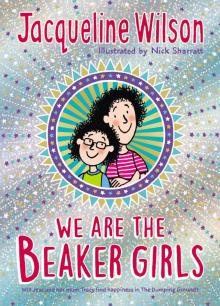 We Are the Beaker Girls
We Are the Beaker Girls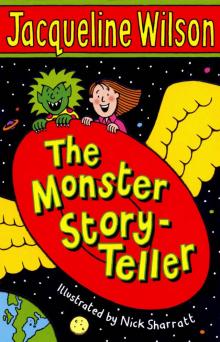 The Monster Story-Teller
The Monster Story-Teller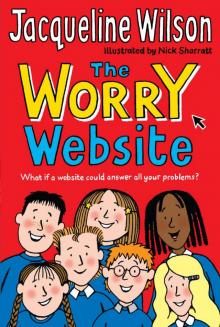 The Worry Website
The Worry Website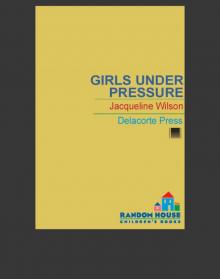 Girls Under Pressure
Girls Under Pressure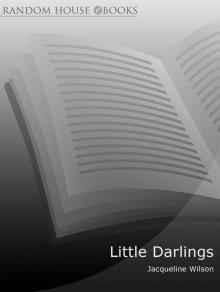 Little Darlings
Little Darlings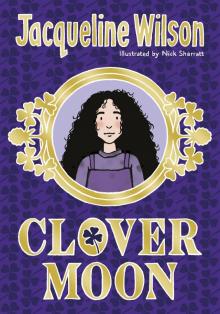 Clover Moon
Clover Moon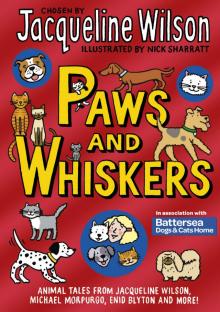 Paws and Whiskers
Paws and Whiskers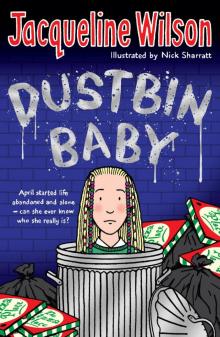 Dustbin Baby
Dustbin Baby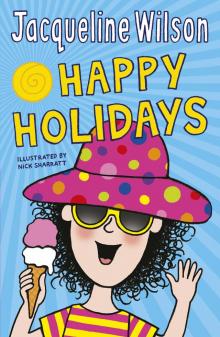 Jacqueline Wilson's Happy Holidays
Jacqueline Wilson's Happy Holidays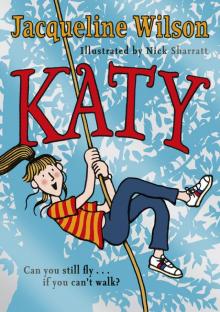 Katy
Katy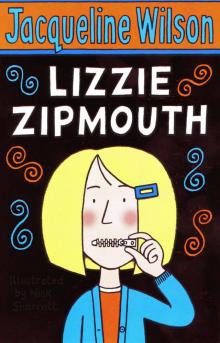 Lizzie Zipmouth
Lizzie Zipmouth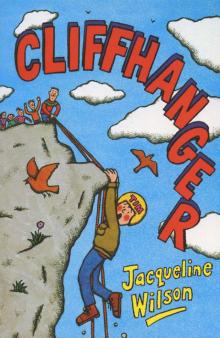 Cliffhanger
Cliffhanger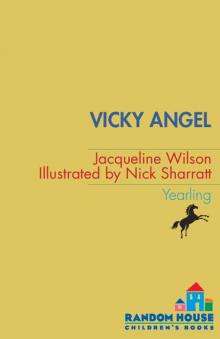 Vicky Angel
Vicky Angel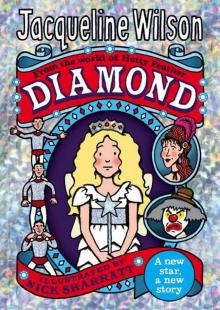 Diamond
Diamond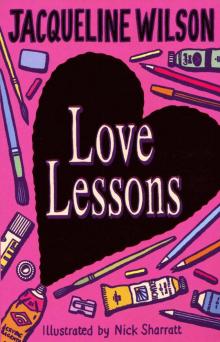 Love Lessons
Love Lessons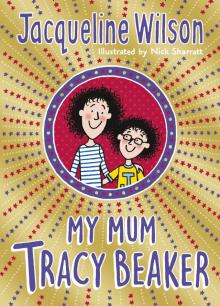 My Mum Tracy Beaker
My Mum Tracy Beaker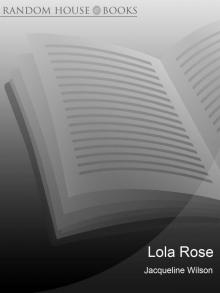 Lola Rose
Lola Rose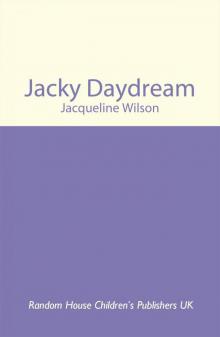 Jacky Daydream
Jacky Daydream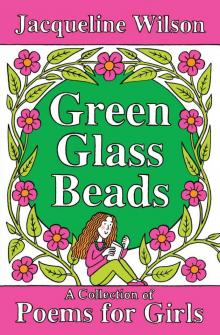 Green Glass Beads
Green Glass Beads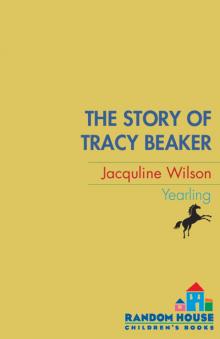 The Story of Tracy Beaker
The Story of Tracy Beaker Clean Break
Clean Break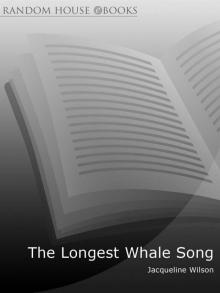 Longest Whale Song
Longest Whale Song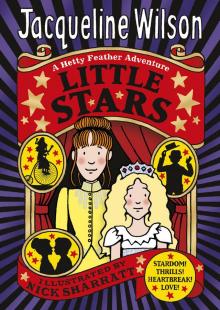 Little Stars
Little Stars Double Act
Double Act The Suitcase Kid
The Suitcase Kid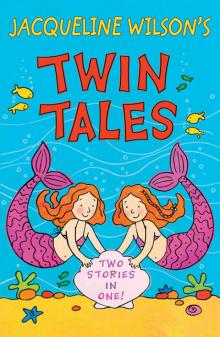 Twin Tales
Twin Tales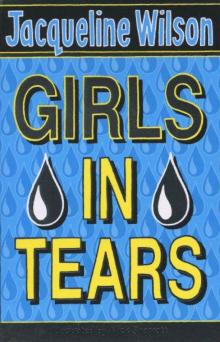 Girls in Tears
Girls in Tears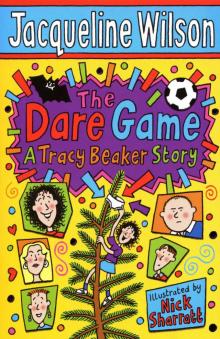 The Dare Game
The Dare Game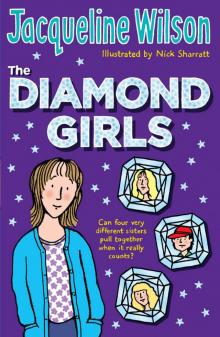 Diamond Girls
Diamond Girls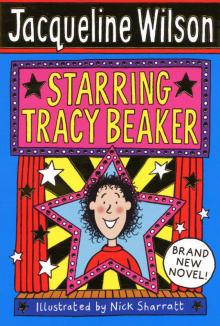 Starring Tracy Beaker
Starring Tracy Beaker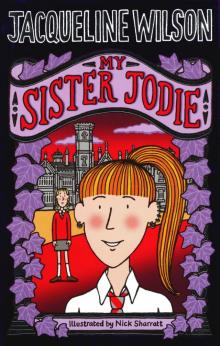 My Sister Jodie
My Sister Jodie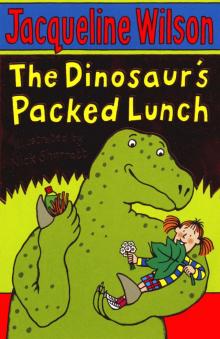 The Dinosaur's Packed Lunch
The Dinosaur's Packed Lunch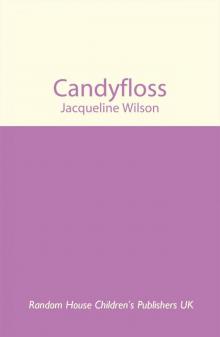 Candyfloss
Candyfloss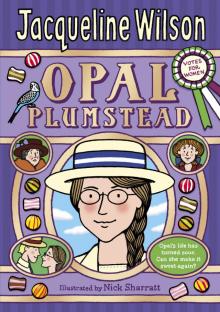 Opal Plumstead
Opal Plumstead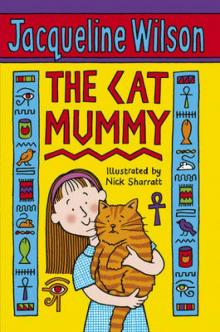 The Cat Mummy
The Cat Mummy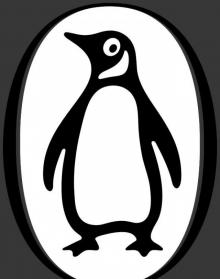 Werepuppy and the Werepuppy on Holiday
Werepuppy and the Werepuppy on Holiday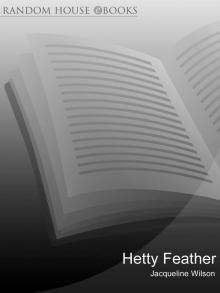 Hetty Feather
Hetty Feather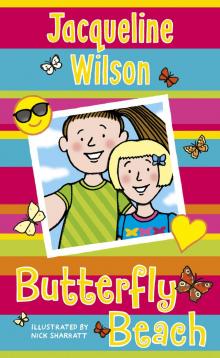 Butterfly Beach
Butterfly Beach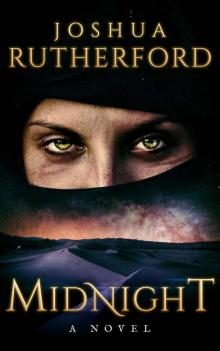 Midnight
Midnight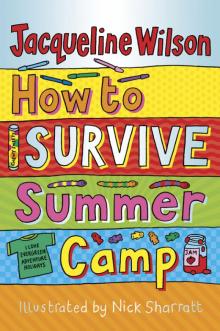 How To Survive Summer Camp (ePub)
How To Survive Summer Camp (ePub)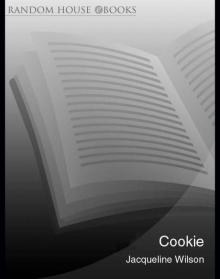 Cookie
Cookie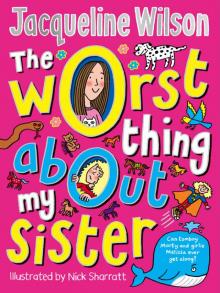 The Worst Thing About My Sister
The Worst Thing About My Sister Bad Girls
Bad Girls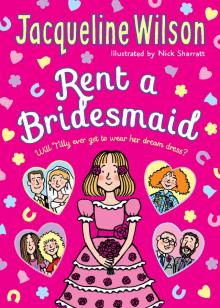 Rent a Bridesmaid
Rent a Bridesmaid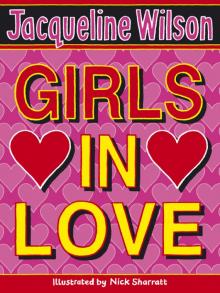 Girls in Love
Girls in Love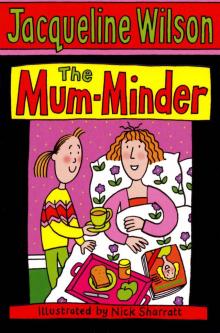 The Mum-Minder
The Mum-Minder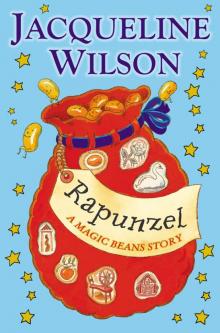 Rapunzel
Rapunzel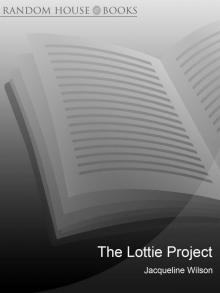 Lottie Project
Lottie Project Best Friends
Best Friends Video Rose and Mark Spark
Video Rose and Mark Spark Glubbslyme
Glubbslyme Girls Out Late
Girls Out Late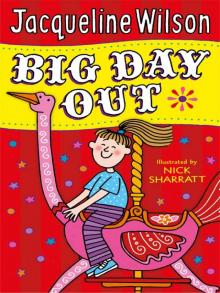 Big Day Out
Big Day Out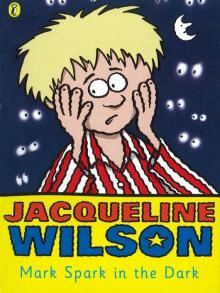 Mark Spark in the Dark
Mark Spark in the Dark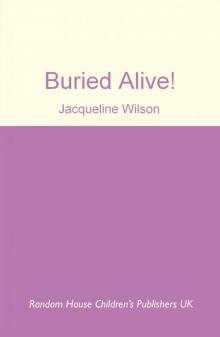 Buried Alive!
Buried Alive!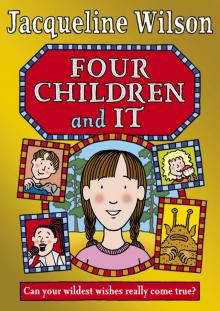 Four Children and It
Four Children and It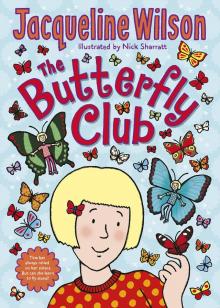 The Butterfly Club
The Butterfly Club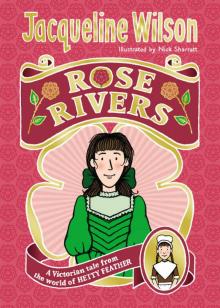 Rose Rivers
Rose Rivers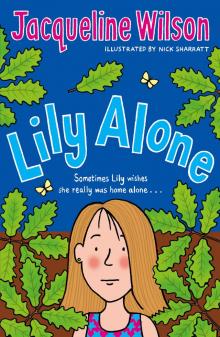 Lily Alone
Lily Alone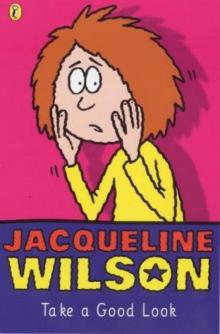 Take a Good Look
Take a Good Look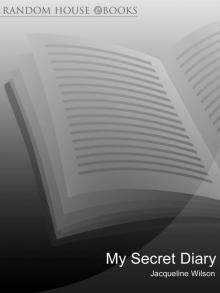 My Secret Diary
My Secret Diary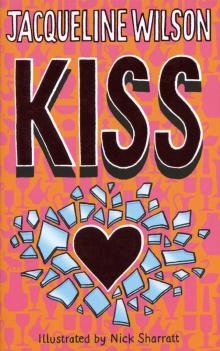 Kiss
Kiss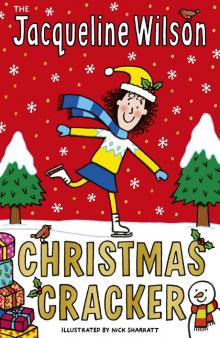 The Jacqueline Wilson Christmas Cracker
The Jacqueline Wilson Christmas Cracker The Worry Web Site
The Worry Web Site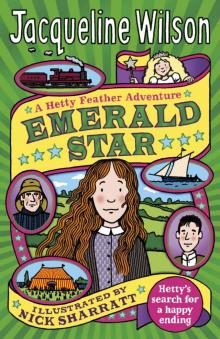 Emerald Star (Hetty Feather)
Emerald Star (Hetty Feather) The Bed and Breakfast Star
The Bed and Breakfast Star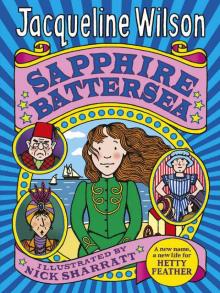 Sapphire Battersea
Sapphire Battersea Cat Mummy
Cat Mummy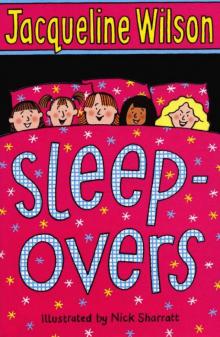 Sleepovers
Sleepovers Dare Game
Dare Game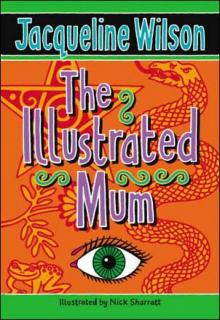 The Illustrated Mum
The Illustrated Mum Secrets
Secrets